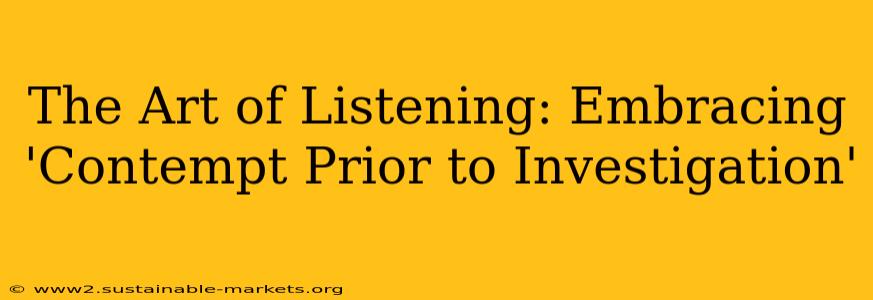The Art of Listening: Embracing 'Contempt Prior to Investigation'? A Paradoxical Approach to Understanding
The phrase "contempt prior to investigation" typically carries a negative connotation, suggesting a closed mind and a refusal to consider opposing viewpoints. Yet, ironically, a nuanced understanding of this concept can reveal a powerful tool for effective listening and critical thinking. This isn't about dismissing perspectives outright, but rather about approaching information with a healthy dose of skepticism – a crucial first step in truly understanding what's being communicated.
This article will explore the seemingly contradictory idea of using a form of "contempt prior to investigation" as a pathway to better listening. We'll unpack what this means in practice and how it can enhance critical thinking and communication.
What Does "Contempt Prior to Investigation" Really Mean in This Context?
In this context, "contempt prior to investigation" doesn't advocate for outright dismissal. Instead, it refers to the initial stage of information processing where we approach claims with a healthy dose of skepticism rather than immediate acceptance. It’s about recognizing that not all information is created equal and that some claims require more scrutiny than others. This initial skepticism is not prejudice but a form of self-protection against misinformation and manipulation.
Think of it like this: you wouldn't blindly trust a stranger who offered you a free diamond necklace; you'd want to investigate the situation first. Similarly, we should approach claims, particularly extraordinary ones, with a degree of caution before accepting them at face value. This doesn't mean we refuse to listen; rather, it means we listen critically and carefully.
Isn't This Just Confirmation Bias?
No, this is different from confirmation bias. Confirmation bias is the tendency to seek out and interpret information that confirms pre-existing beliefs, while ignoring information that contradicts them. "Contempt prior to investigation," as described here, is about approaching all information with a degree of healthy skepticism, regardless of whether it aligns with our pre-existing beliefs. It's about temporarily suspending judgment until sufficient evidence is presented.
How Can I Practically Apply "Contempt Prior to Investigation"?
The key is to actively engage in the following steps:
- Identify the Source: Who is presenting the information? What is their motivation? Are they credible? Understanding the source is crucial in assessing the reliability of the information.
- Look for Evidence: What evidence is presented to support the claim? Is this evidence credible, verifiable, and sufficient?
- Consider Alternative Explanations: Are there other possible explanations for the information presented? Often, there are multiple perspectives, and a critical listener will consider them all.
- Evaluate the Logic: Does the reasoning make sense? Are there any logical fallacies present?
- Suspend Judgment: Avoid forming a definitive opinion until you've carefully considered all the information and its implications.
Doesn't This Approach Hinder Open-Mindedness?
Paradoxically, this approach can actually enhance open-mindedness. By approaching information critically, we avoid being swayed by emotional appeals or misleading rhetoric. It allows us to engage with diverse perspectives more effectively, because we're not simply accepting everything at face value. True open-mindedness requires careful consideration and critical evaluation, not blind acceptance.
What are the Benefits of this Approach?
The benefits of approaching information with a degree of healthy skepticism are significant:
- Improved Critical Thinking Skills: It encourages a more rigorous and thoughtful approach to information processing.
- Reduced Susceptibility to Misinformation: It helps protect against manipulation and deceptive tactics.
- Enhanced Communication: It enables more effective engagement with diverse perspectives and the ability to identify biases and logical fallacies.
- Greater Self-Awareness: It helps us recognize our own biases and assumptions.
By embracing a measured approach that incorporates a degree of "contempt prior to investigation," we can transform our listening habits from passive acceptance to active engagement. It's not about shutting down dialogue, but about listening critically and thoughtfully to truly understand the world around us. This paradoxical approach empowers us to become better listeners, thinkers, and communicators.

